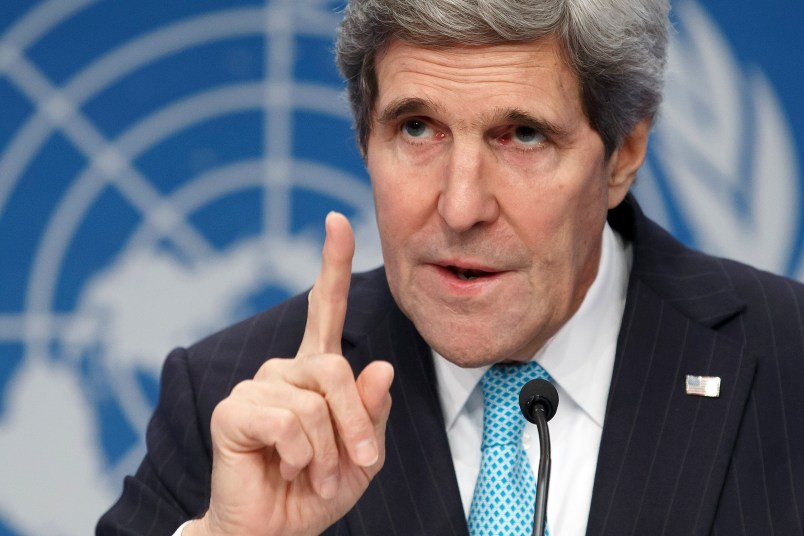CAIRO (AP) — U.S. Secretary of State John Kerry on Saturday hailed Egypt as an “important partner” in the emerging coalition aimed at beating back the extremist Islamic State group, while stressing that the need for Cairo’s support would not lead Washington to ignore human rights concerns.
During a visit to Cairo, Kerry referred to Egypt as “an intellectual and cultural capital to the Muslim world,” saying it has a “critical role” to play in denouncing the harsh ideology of the Islamic State group, which has seized much of northeastern Syria and northern and western Iraq.
Egypt is home to Al-Azhar University, one of the oldest and most revered centers of religious learning for Sunni Muslims. It has issued several statements and religious edicts condemning the Islamic State group and its self-styled caliphate.
Kerry spoke after meeting with President Abdel-Fattah el-Sissi on how Egypt might contribute to the coalition. The top U.S. diplomat did not elaborate about what they had discussed.
“Almost every country has an ability to play some kind of role in this fight against ISIL, and to join this coalition one way or the other,” Kerry said, using an acronym for the Islamic State group.
“The bottom line is that terrorists like ISIL have no place in the modern world. But it’s up to the world to enforce that truth.”
Nearly 40 nations have agreed to contribute to what Kerry said would be a worldwide fight to defeat the militants.
Egypt is unlikely to send troops to battle the Islamic State group but could provide logistical and intelligence support to the coalition.
Egypt’s Foreign Minister Sameh Shukri told the Egyptian daily Seventh Day earlier this week that Egypt’s participation in the coalition “doesn’t necessarily mean that we will participate in a military action.”
Kerry’s visit comes two days after representatives from 10 Arab countries, including Egypt, met with the top American diplomat in the Saudi city of Jiddah promising to “do their share” to fight the Islamic State militants.
NATO member Turkey has refused to join, while the United States has said it will not partner with Iran or Syrian President Bashar Assad’s government, despite the fact that both view the Islamic State group as a major threat.
When asked whether the coalition should be limited to Sunni Arab nations or if it should include Iran, Shukri said “we believe that this action and the elimination of terrorism is a collective responsibility for all members of the international community.” He did not mention Iran by name.
He pledged that Egypt will work on preventing, “any form of funding or communication in any form between these organizations and also to fight the ideas of these extremist organizations.”
U.S.-Egypt ties have been strained since July 2013, when el-Sissi, then the army chief, overthrew Islamist President Mohammed Morsi amid massive protests demanding his resignation.
The U.S. has criticized Egypt’s subsequent massive crackdown on Morsi’s supporters and withheld some military aid while urging Cairo to press ahead with a democratic transition and respect human rights.
Kerry called Egypt a friend and an ally, and said the U.S. wants the government in Cairo to succeed. He acknowledged that “sometimes friends have disagreement over one thing or the other” but insisted decades-long ties between Washington and Cairo would endure.
When asked about Egypt imprisoning journalists from the Qatar-based Al-Jazeera network over terrorism-related charges, Kerry said he had raised those concerns with el-Sissi on Saturday. He insisted the U.S. “does not ever trade its concerns for human rights for any other objective.”
Copyright 2014 The Associated Press. All rights reserved. This material may not be published, broadcast, rewritten or redistributed.







It is worrying that the repressive Wahabbi tyrants in Qatar and Saudi Arabia and its army of mullahs are not supporting the United States in its actions against ISIL. Sunni Saudi serfdoms like Egypt are sadly following suit. Unfortunately, these tribalistic societies have a broken social fabric, lazy and amoral citizens who are corrupted by oil money. The folk in these countries seem to think that beheading people of other faiths is an essential tenet of their religion and that funding terrorists after listening to friday afternoon mullahs misguided by the koran is charity.
ISIS is simply another terrorist organization like Al Qaeda, Taliban, Boko Haram, Al Shabab and the others – it is a product of its environment. The real problem are flames of the medusa headed Wahabbi Sunni religion, which promotes jihadi violence and evil as a religious virtue rewarded with virgins and sex in heaven.
It is time to depose the monarchy and install secular democratic governments, fully separated from the military and the mullahood, that promise free speech and full freedoms to all citizens including women.
It ls time to take on the wahabbi sunni geopolitical interests the same determination that we took on the nazis and communists.
The so-called holy mosques in Saudi Arabia are being defiled by the terroristic practices of its citizens and king. The mosque region should be turned into protectorate and handed over to a religious authorities from all of islam’s sects. The stranglehold of the virulent and amoral wahabbi mullahs has to go.
For too long, US foreign policy was driven oil and by Israel’s security interests. The dismantling of evil nations, governments, social, religious and educational structures that engage in terrorism as a religious virtue and for establishing a caliphate, propagating medieval sharia law and madrasssa education across Middle East, Asia, Europe and Africa have to factored into our foreign policy calculus. We should be unafraid to take care of problems at their root.